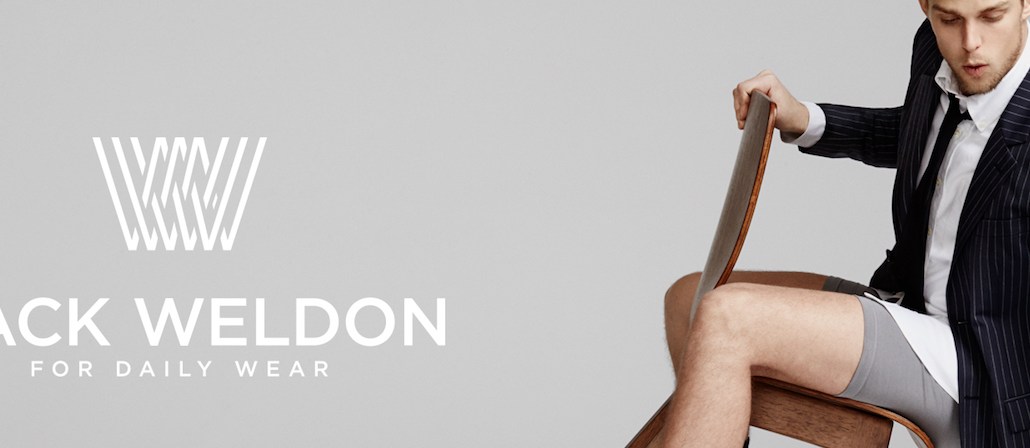Secure your place at the Digiday Media Buying Summit in Nashville, March 2-4

Men don’t feel comfortable talking about their underwear because it’s personal. But men like hearing underwear jokes in podcasts because they are relatable. That’s an observation from Collin Willardson, marketing manager for Mack Weldon.
The New York-based men’s underwear brand has been experimenting with podcasting for a year. Most recently, it collaborated with Comedy Bang Bang on a live ad read at SXSW, where comedian Paul F. Tompkins played a Mack Weldon executive and mocked an underwear model (played by Willardson) in his live show. The ad read made a stir on Reddit where users left comments like “That was a long-ass ad read. Loved it.” and “Man was this ever good. Makes me want to get some of these underwears.”
“Because of the humorous content, people started downloading our podcast,” said Willardson. “We’d worked with Comedy Bang Bang before, but the live read doubled our sales.”
Willardson believes that a sense of humor helps Mack Weldon keep its podcast listeners coming back. He’s trying to bring underwear jokes to a wide range of shows and topics. For example, in a sports podcast Mack Weldon can make fun of the universal issue of sagging and pinching undergarments, and in a technology show, Mack Weldon can explain its high-performance fabric.
Podcast advertising now represents 25 percent of Mack Weldon’s overall ad budget per month, 100 times more than a year ago. The medium has become more effective than display ads for the company, because when people listen to podcasts, they are fully engaged and they can continue listening while making a purchase.
“We paid for native and display ads on online publications before, but we found that readers could easily get distracted by 48 things on the homepage,” said Willardson.
Podcast advertising also has a great potential for smaller advertisers who are looking for measurable ROI on their ad spend, because they can track each episode’s performance simply through promotional codes and vanity URLs told by the podcaster. Metrics aside, there’s a halo-effect around the advertised products and services that good content provides.
In order to keep content authentic, Willardson decided not to work with agencies. “When we sign on shows, we ask the host to do what they feel is best for their audience and the show,” he said. “They’re the ones talking to their audience in every episode, so they know what their audience likes and dislikes.”
Podcast listeners are estimated to reach 98 million this year, up 3 percent from a year prior, according to Edison Research. The same report shows that those who consume podcasts every week listen to an average of five episodes a week.
Brands are aware of the trend. In the past few months alone, podcast advertising network Midroll added Dunkin’ Donuts, Chipotle, Allstate, Wendy’s and Procter & Gamble as advertisers, said Lex Friedman, the company’s evp of sales and development. Publishers, on the other hand, are taking an active role in podcast production. Last year, radio companies –including NPR, WBEZ and WNYC – hosted the first podcast upfront to extol the merits of podcasting as an ad format.
While podcasts are enjoying their moment, they do come with some complications. There are unresolved issues around measurement that are preventing brands from pouring money into the medium. Some brands still depend on downloads to decide if the medium is a good investment. But the number of downloads cannot present the full picture of how many people actually listen to a podcast. In order to build a direct relationship between listeners and podcasts, media companies like The Financial Times will focus on specific URLs this year as a more accurate metric.
But those obstacles are not deal breakers for Mack Weldon. As the company continues to focus on making guys more comfortable in their skivvies, Willardson wants to deliver more entertaining podcast ads. “Some brands are doing well in podcasting, while some are not,” he said. “We have really fallen in love with this channel, and we will try to measure it as accurately as possible.”
More in Marketing

WTF are tokens?
When someone sends a prompt or receives a response, the system breaks language into small segments. These fragments are tokens.

AI is changing how retailers select tech partners
The quick rise of artificial intelligence-powered tools has reshaped retailers’ process of selecting technology partners for anything from marketing to supply chain to merchandising.

YouTube’s upmarket TV push still runs on mid-funnel DNA
YouTube is balancing wanting to be premium TV, the short-form powerhouse and a creator economy engine all at once.





